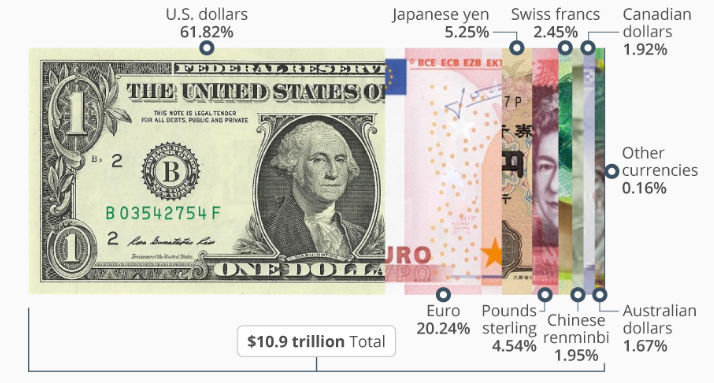A reserve currency (RC) represents a substantial amount of any currency that remains a “reserve” by a country’s central bank and other leading financial organizations.
They keep currency in reserve for different transactions and investments, among many other things. The value of the current trade system worldwide is about $20 billion, which means it requires loads of currencies in reserve.
Indeed, around $5 trillion exchanges hand each day in currency. So, keep reading to learn more regarding this concern.
Key Takeaways
- Reserve currency
(RC) is the most useful and strongest currency possessed by any country's
central bank and leading financial organizations.
- Currently, the US Dollar (US$) is dominating RC globally.
- The key feature of RC is that it's easy to convert with a
stable value.
- The determining factors of usage of RC include the size of the
domestic economy, depth and openness of its financial markets, value in
the global trade economy, and domestic macroeconomic strategies.
- RC plays a vital role in paying off international debt, leveraging the country's currency value, and balancing a nation's exchange rate.
What Role Does A Reserve Currency Play?
Reserving currency helps to minimize the risk of the exchange rate. The reason is that a country doesn’t need its currency to exchange when they need to purchase something.
It’s an essential concept in global trade as the countries reverse currency to resolve requirements while making international trade. Also, it plays a vital role in ensuring liquidity during a crisis.
Moreover,
it helps diversify a central bank's portfolios, improving credit ratings and
reducing risks.
What Are The Deciding Factors Of The Usage Of A Reserve Currency?
The
reserve of currency largely depends on the strength and size of the
- The capacity of a country’s domestic economy
- Financial markets’ size, depth, and openness
- Economic importance in global business
- Guidelines of domestic micro-economy
- Currency to use as the currency hook
What Are The Top Reserve Currencies Of The World?
American
dollar ($) has been the leading reserve
currency for over 70 years. Hence, countries monitor the
Thus,
they ensure their reserve’s security. The International Monetary Fund (IMF)
updates the Currency Composition of Official Foreign Exchange Reserves (COFER).
According
to IMF, some other selected currencies for reserve include:
- Euro
- Pounds Sterling
- Swiss Francs
- Chinese Renminbi
- Australian Dollars
- Japanese Yen
- Canadian Dollars
The Bottom Line
A reserve currency is a game-changer in a
country’s domestic economy by influencing exchange rates. Because of the strong
economy of
As a result, many nations with other currencies use US dollars to perform their international transactions. They must convert their national currencies into US dollars while making international dealings.
For
this reason, Asian countries transact with US dollars despite neighboring trade
partners.

No comments:
Post a Comment
Put Your Thoughts Below: